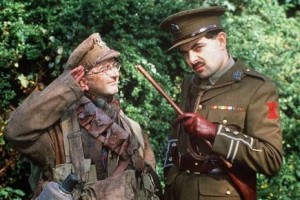I think I’m gonna try something I’ve never done before. In theater, that’s probably a good idea.
I haven’t done anything really new since 2011, when I stripped completely naked in an audition. I didn’t get cast (shocking no one), and I’ll probably never go to that theater again out of embarrassment (I lost my place in my monolog, which has only happened to me once before in my life, in a class I was auditing), BUT it did help me take bigger chances and be more open onstage.
In October, I’ll be playing Duncan and the Porter in Accidental Shakespeare’s production of MacBeth. This’ll be my third time playing these two roles, the first being in Unrehearsed Shakespeare’s most recent Mackers, and almost immediately after as an understudy in EDGE Theatre’s MacSith, which is exactly what it sounds like it is.
Thanks to Unrehearsed, MacBeth is a show with which I am very familiar, second perhaps only to Twelfth Night. So I find myself wondering if there’s anything I can do to make the roles original again for me. And, I suppose, part of me is wondering if I even should.
I came up with this while lamenting the lack of sincerity in contemporary acting. I’ve said more times than I can count (and more times than anyone else would want to count), that contemporary “naturalism” is just a bizarre pseudo-Brechtian collection of noises and facial gesticulations based on screen performances, meant to communicate emotional ideas to an audience well-trained (again, by the screen) to interpret these Delsarte-like symbols as genuine emotion… even though they’re not. This gets actors so inside-their-heads, that my brief forays into directing will sometimes see me demanding that an actor pay the slightest bit of attention to the actor for whose benefit they are allegedly speaking their lines.
This all led me back to the very elementary notion of “making the lines your own.” I often say, and do still believe, that the important thing is that you know what you’re saying and why you’re saying it. All the same, if I’m going to buy into this naturalism business that everyone’s touting, ‘owning’ the lines is a great way to help make yourself more emotionally vulnerable, which is something I don’t think I’ve done very often onstage.
So, I think I’m going to go through all my lines and translate them to “in my own words.” I’ve never done this before. I always found the idea insultingly schoolish: I know what I’m saying, don’t I? Why should I have to prove it to you, Heir Director? Even as early as fourth grade, I got in trouble in Math class for not showing my work.
But I think saying the lines my way will help break down an emotional barrier or two. When I’m directing, I frequently tell actors not to be ruled by the lines, nor to use the script as an excuse: if you don’t feel the impulse to say your line, then don’t; if you don’t have a reason to be onstage, then leave. But I think I’m using the script as a bit of a crutch myself, so I’ll see if this supposedly elementary practice won’t free up some fluids.
This is obviously just for my benefit. I don’t anticipate much demand for emotional vulnerability from King Duncan or the Porter, but growing as an artist and all that, is usually fun.
Also, I just finished watching all four seasons of Black Adder, so forgive me if my language is a bit stuffier than usual.


